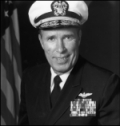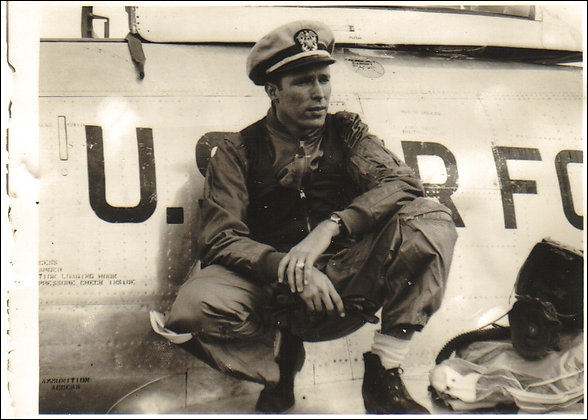Admiral Led Grenada Invasion
By Patricia Sullivan
Courtesy of the Washington Post
Thursday, February 12, 2009
Wesley L. McDonald, 84, a four-star Navy Admiral who commanded the 1983 invasion of Grenada for the U.S. military and who as a pilot led the first air strike against North Vietnam in 1964 after the Gulf of Tonkin incident, died February 8, 2009, at his home in Arlington, Virginia.
He had normal pressure hydrocephalus, a neurological disorder.
Admiral McDonald was commander in chief of all NATO and U.S. forces in the Atlantic when he was placed in charge of Operation Urgent Fury, the planned invasion of the Caribbean island nation of Grenada.
Ostensibly, the mission was to evacuate hundreds of U.S. medical students studying there after an internal coup of the socialist government. The Reagan administration feared a Soviet-sponsored Cuban military buildup, and some of the region’s other countries asked for U.S. intervention.
About 6,000 U.S. soldiers and Marines overwhelmed the 1,200 Grenadians and 780 Cubans in the waning days of October 1983. Admiral McDonald told the Senate Armed Services Committee several months later that despite inaccurate maps, problems with radio communications between different forces and the barring of press coverage during the invasion, Operation Urgent Fury was “a complete success.”
In 1985, the Pentagon’s inspector general was sharply critical of Admiral McDonald for failing to direct a full investigation of his subordinate, Vice Admiral Joseph Metcalf II, the task force commander of the invasion.
Metcalf took 24 captured Soviet-made rifles from Grenada, despite federal and military rules prohibiting such spoils. Lower-ranking soldiers had been disciplined for similar transgressions, but Admiral McDonald used bad judgment in allowing Metcalf to determine there was no need for an inquiry, the inspector general’s report said.
Wesley Lee McDonald was born July 6, 1924, in Washington. He graduated from Washington-Lee High School in Arlington and joined the U.S. Naval Academy at Annapolis as a member of the Class of 1947. That class, which matriculated a year early, included President Jimmy Carter, CIA Director Stansfield Turner, Vice Admiral James B. Stockdale, who was a Medal of Honor recipient, and Joint Chiefs of Staff chairman William J. Crowe.
As an Ensign, Wesley McDonald served in a South Pole expedition headed by Admiral Richard E. Byrd. As a Lieutenant and naval aviator, he served aboard several aircraft carriers, including the Coral Sea, which he returned to command in 1970-71.
In 1964, he was commander of an attack squadron flying A-4 Skyhawks from the carrier Ticonderoga when the destroyer Turner Joy reported it was under attack by North Vietnamese torpedo boats. Then-President Lyndon B. Johnson ordered retaliatory air strikes, dubbed Operation Pierce Arrow, for which future Admiral McDonald was the flight leader.
Admiral Wesley L. McDonald, then a Navy pilot, led the first U.S. bombing strike on North Vietnam in 1964. (Navy Photo)
Whether the ships were under attack in the Tonkin Gulf has become a matter of serious historical dispute. Admiral McDonald later said he didn’t see anything in the water that night except American ships.
He rose through the Navy’s ranks, graduated from the National Defense University in 1969 and, after commanding the Coral Sea, became a Rear Admiral and carrier group commander during the final stages of the Vietnam War. His other posts included deputy chief of naval personnel, deputy chief of naval operations for air warfare and commander of the 2nd Fleet. In 1982, when he was promoted to Admiral, he became Supreme Allied Commander Atlantic, one of two senior commanders in NATO. At the same time, he assumed command of the U.S. Atlantic Command and the Atlantic Fleet. After Admiral McDonald retired from the Navy in 1985, he volunteered for the National Aeronautic Association, which later named its Elder Statesman of Aviation Award in his honor. Three naval aviation organizations jointly created a leadership award in his name, as well.
His military awards included the Defense Distinguished Service Medal, the Navy Distinguished Service Medal, the Legion of Merit, the Distinguished Flying Cross and the Air Medal.
His first wife and high school sweetheart, Norma Joy McDonald, died in 1989.
Survivors include his wife of 16 years, Helen McDonald of Arlington; four children from his first marriage, retired Marine Corps Lieutenant Colonel Thomas O. McDonald of San Antonio, Kathryn L. Overman of Lake Forest, California, Joy A. McDonald of Annandale and Toni M. McDonald of Santa Barbara, California; a brother; a half brother; a half sister; eight grandchildren; and six great-grandchildren.
Admiral Wesley L. McDonald, USN (Retired) passed away peacefully on February 8, 2009 after a long illness. He is survived by his wife Helen, and children, Tom, Kathy, Joy and Toni, 8 grandchildren and 6 great grandchildren.
McDonald graduated from the United States Naval Academy in 1946. He began his Navy career as a naval aviator in 1950, serving in several carrier fighter and attack squadrons. In 1964, he took command of Attack Squadron VA-56 flying A-4 Skyhawks aboard USS Ticonderoga. On August 5, 1964 he served as flight leader for Operation Pierce Arrow, the first retaliatory strike against North Vietnam following the Gulf of Tonkin incident.
McDonald’s career led him to the highest levels of the United States Navy. He attended the National Defense University graduating in 1969. From 1970-1971 he commanded the aircraft carrier, USS Coral Sea. In 1972, he was promoted to Rear Admiral, serving as the carrier group commander. He later served as deputy chief of Naval Personnel in Washington, DC and after promotion to Vice Admiral served as Commander U.S. Second Fleet.
In 1982, he was promoted to Admiral and was appointed Supreme Allied Commander Atlantic, one of two senior commanders in NATO. At the same time, he assumed command of the U.S. Atlantic Command and U.S. Atlantic Fleet. In 1983 McDonald, in his role as Commander in Chief of the Atlantic, was placed in overall command of Operation Urgent Fury, the invasion of Grenada to rescue U.S. nationals.
Since his retirement from the Navy in 1985, McDonald played an active role in the aviation community in his leadership positions with the National Aeronautic Association and National Aviation Club. McDonald also served on the boards of the U.S. Navy Memorial Foundation, the U.S. Naval Aviation Museum and the Armed Services YMCA.
His first wife, Norma, died in 1989. McDonald later remarried and lived in Arlington, Virginia with his wife Helen.
McDonald’s awards included the Defense Distinguished Service Medal, the Navy Distinguished Service Medal, the Legion of Merit, the Distinguished Flying Cross, the Air Medal and awards from several European and South American nations.
Interment will be at Arlington National Cemetery with a service to be held on Wednesday, May 20, 2009 at 1 p.m. at the Ft. Myer Post Chapel.
Michael Robert Patterson was born in Arlington and is the son of a former officer of the US Army. So it was no wonder that sooner or later his interests drew him to American history and especially to American military history. Many of his articles can be found on renowned portals like the New York Times, Washingtonpost or Wikipedia.
Reviewed by: Michael Howard


